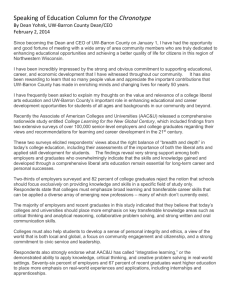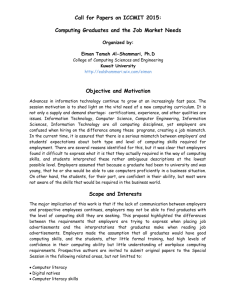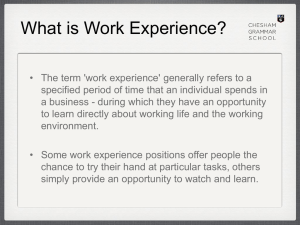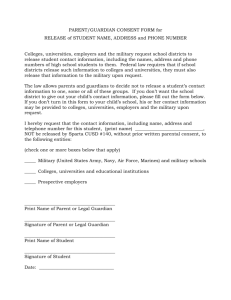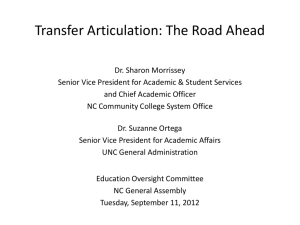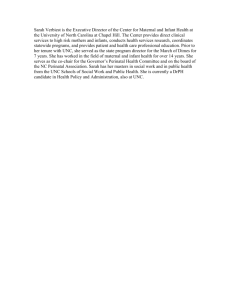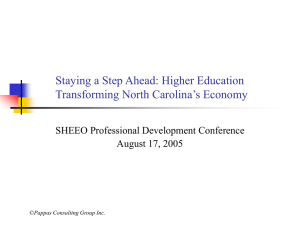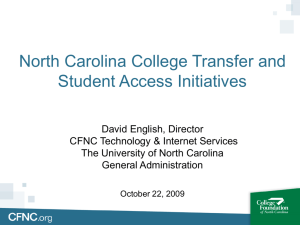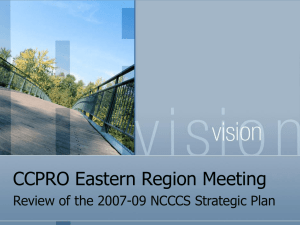urging inclusion of Communication courses
advertisement
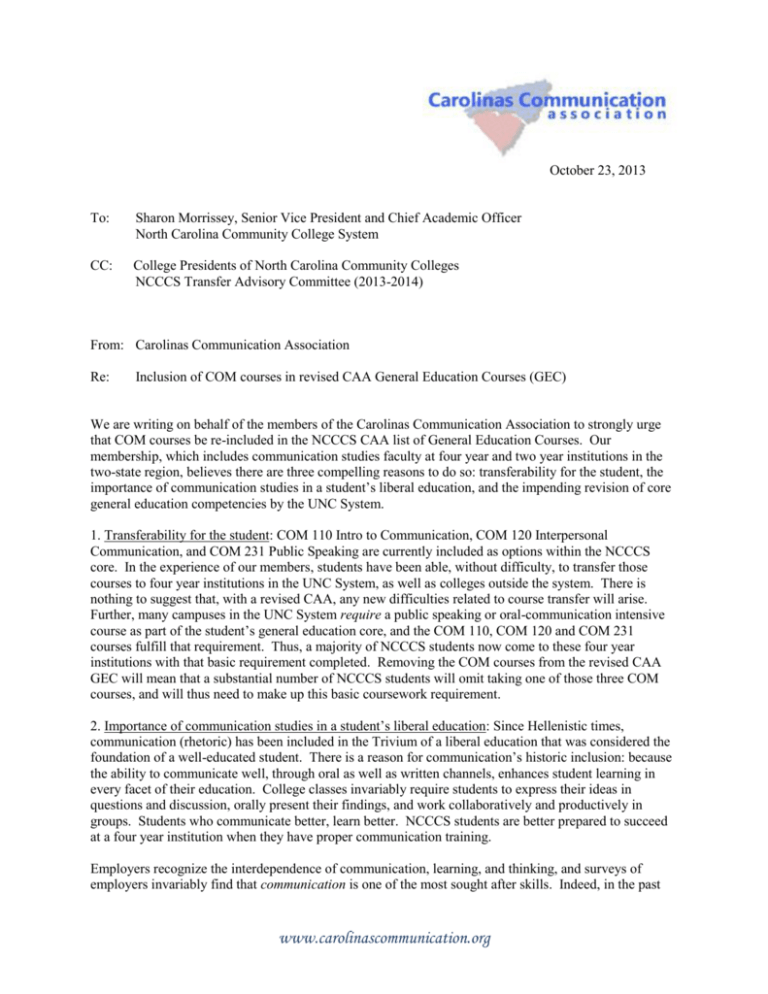
October 23, 2013 To: Sharon Morrissey, Senior Vice President and Chief Academic Officer North Carolina Community College System CC: College Presidents of North Carolina Community Colleges NCCCS Transfer Advisory Committee (2013-2014) From: Carolinas Communication Association Re: Inclusion of COM courses in revised CAA General Education Courses (GEC) We are writing on behalf of the members of the Carolinas Communication Association to strongly urge that COM courses be re-included in the NCCCS CAA list of General Education Courses. Our membership, which includes communication studies faculty at four year and two year institutions in the two-state region, believes there are three compelling reasons to do so: transferability for the student, the importance of communication studies in a student’s liberal education, and the impending revision of core general education competencies by the UNC System. 1. Transferability for the student: COM 110 Intro to Communication, COM 120 Interpersonal Communication, and COM 231 Public Speaking are currently included as options within the NCCCS core. In the experience of our members, students have been able, without difficulty, to transfer those courses to four year institutions in the UNC System, as well as colleges outside the system. There is nothing to suggest that, with a revised CAA, any new difficulties related to course transfer will arise. Further, many campuses in the UNC System require a public speaking or oral-communication intensive course as part of the student’s general education core, and the COM 110, COM 120 and COM 231 courses fulfill that requirement. Thus, a majority of NCCCS students now come to these four year institutions with that basic requirement completed. Removing the COM courses from the revised CAA GEC will mean that a substantial number of NCCCS students will omit taking one of those three COM courses, and will thus need to make up this basic coursework requirement. 2. Importance of communication studies in a student’s liberal education: Since Hellenistic times, communication (rhetoric) has been included in the Trivium of a liberal education that was considered the foundation of a well-educated student. There is a reason for communication’s historic inclusion: because the ability to communicate well, through oral as well as written channels, enhances student learning in every facet of their education. College classes invariably require students to express their ideas in questions and discussion, orally present their findings, and work collaboratively and productively in groups. Students who communicate better, learn better. NCCCS students are better prepared to succeed at a four year institution when they have proper communication training. Employers recognize the interdependence of communication, learning, and thinking, and surveys of employers invariably find that communication is one of the most sought after skills. Indeed, in the past www.carolinascommunication.org year alone, three surveys conducted by the Association of American Colleges and Universities (AACU), the Chronicle of Higher Education/American Public Media’s Marketplace (CHE/APM), and Northeastern University have yielded identical findings. The Northeastern University study, the second it has conducted on employer and public attitudes, found that “American adults and employers want colleges to produce graduates who can think critically and creatively, and can communicate orally and in writing.”1 Elaborating on the findings of the AACU’s survey, the president of National Grid, a gas and electric company, observed that “new employees must have strong collaboration, communication, and problemsolving skills.” 2 Although employers demonstrably want such skills, the CHE/APM study found what many such polls have also concluded—that employers are disappointed with the skills that many college graduates bring to the workplace: “When it comes to the skills most needed by employers, job candidates are lacking most in written and oral communication skills, adaptability and managing multiple priorities, and making decisions and problem solving.”3 Perhaps most importantly, however, employers place the responsibility for the acquisition of these skills on colleges. The CHE/APM study found that employers believe that it is incumbent upon “colleges to prepare graduates in written and oral communications and decision-making skills, [and] results indicate that colleges need to work harder to produce these traits in their graduates.”4 These studies—and many previous studies like them—argue persuasively that rather than reducing the requirements that COM classes be taken as GEC, students would materially benefit in their studies and employment if such requirements were increased. 3. Impending revision of core general education competencies by the UNC System. Because of the value communication studies courses provide, as demonstrated in the previous section, the UNC System has already included “Communication Skills” as one of the eight core competencies that will be expected for graduates from all sixteen constituent institutions.5 While the details about how that competency will be incorporated into the comprehensive general education system have not yet emerged, the Faculty Advisory Council’s “Our University, Our Future: A Faculty Vision for UNC Strategic Directions” suggests the direction in which such implementation might proceed. In Goal 3.1 under General Education, the FAC proposes to “Improve student proficiency in 21st century life skills such as critical and creative thinking; analytical reasoning; problem solving; oral and written communication; team work; and information and technology literacy.”6 Communication skills, including oral communication skills, should and almost certainly will be included among the UNC System’s general education core competencies. Those competencies should be included in the NCCCS GEC core as well. Our membership strongly believes that re-including COM classes among the NCCCS’s CAA GEC core will assist NCCCS students who transfer to UNC System colleges, improve their academic performance, contribute to improved retention and graduation rates, and produce graduates who are better prepared for the workplace of the 21st century. We strongly encourage the NCCCS administration to review the proposed revision to the CAA GEC, and to re-include COM courses as part of the general education for community college students in North Carolina. 1 Dan Berrett, “Employers and Public Favor Graduates Who Can Communicate, Survey Finds,” Chronicle of Higher Education 18 Sep. 2013. Emphasis ours. 2 Beckie Supiano, “Employers Want Broadly Educated New Hires, Surveys Find,” Chronicle of Higher Education 10 Apr. 2013. Emphasis ours. 3 Karin Fischer, “A College Degree Sorts Applicants, But Employers Wish It Meant More,” Chronicle of Higher Education 11 Oct. 2013. Emphasis ours. One significant note: this survey also found that students who had majored in Media/Communication majors received the highest favorable ratings from their employers in relation to their oral and written communication skills. 4 Fischer. Emphasis ours. 5 Our Time, Our Future: A Compact with North Carolina, Strategic Directions 2013-2018; pp. 43-44. 6 Faculty Advisory Council, “Our Time, Our Future: A Faculty Vision for UNC Strategic Directions,” 25 Nov. 2012: II.6. www.carolinascommunication.org Submitted on behalf of the Carolinas Communication Association: Linda White, President Central Piedmont Community College linda.white@cpcc.edu Jason Black, First Vice President University of Alabama Jason.black@ua.edu Robert Westerfelhaus, Second Vice President College of Charleston westerfelhausr@cofc.edu Lynn Gregory, Treasurer Appalachian State University gregoryld@appstate.edu Elizabeth J. Natalle, Secretary University of North Carolina at Greensboro ejnatall@uncg.edu Jason Munsell, Journal Editor Columbia College jmunsell@columbiasc.edu Charmaine Wilson, Immediate Past President University of South Carolina at Aiken CharW@usca.edu Richard W. Leeman, Past President University of North Carolina at Charlotte rwleeman@uncc.edu Elena Martinez-Vidal, Social Media Coordinator Midlands Technical College vidale@midlandstech.edu www.carolinascommunication.org
